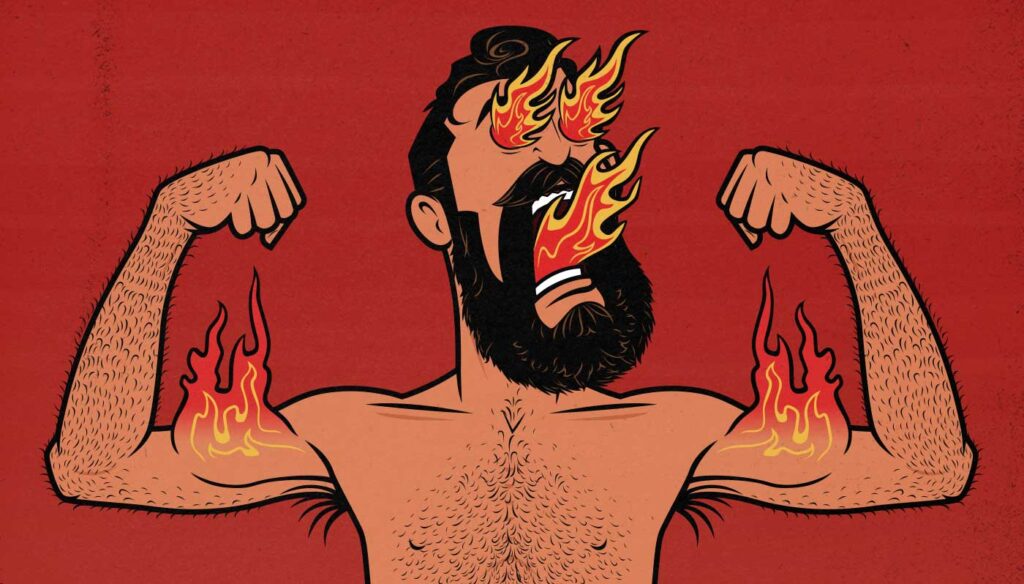
How to Gain Weight With A Fast Metabolism
Skinny people often have a few traits dragging their weight down: thin bones, narrow frames, small stomachs, meagre appetites, and fast metabolisms. In this article, we’ll focus on that very last piece of the puzzle: how to gain weight with a raging metabolism. This is something we know all too well. I’ve lived it. So have Marco and Cassandra. And so have the 10,000 clients we’ve coached through it.
It’s not quite as simple as people often assume, though. Your trouble gaining weight probably has less to do with having a “fast” metabolism and more to do with having an “adaptive” metabolism. As in, the more food you eat, the more your metabolism revs up, and the more calories you burn. This is what the term “hardgainer” refers to. I think it’s also why some skinny people are dubbed “non-responders” when they first start lifting weights.
So, how can you gain muscle, strength, and weight with a fast metabolism? Let’s dive in.
- Video Version
- Introduction
- Fast Metabolisms Vs Adaptive Metabolisms
- Do Hardgainers Have Bad Muscle-Building Genetics?
- Why Hardgainers Have Trouble Gaining Weight
- Progressively Overload Your Metabolism
- How to Gain Weight—Consistently
- Do You Need to Count Calories?
- Remember to Train Specifically for Muscle Size
- Get Plenty of Good Sleep
- Summary
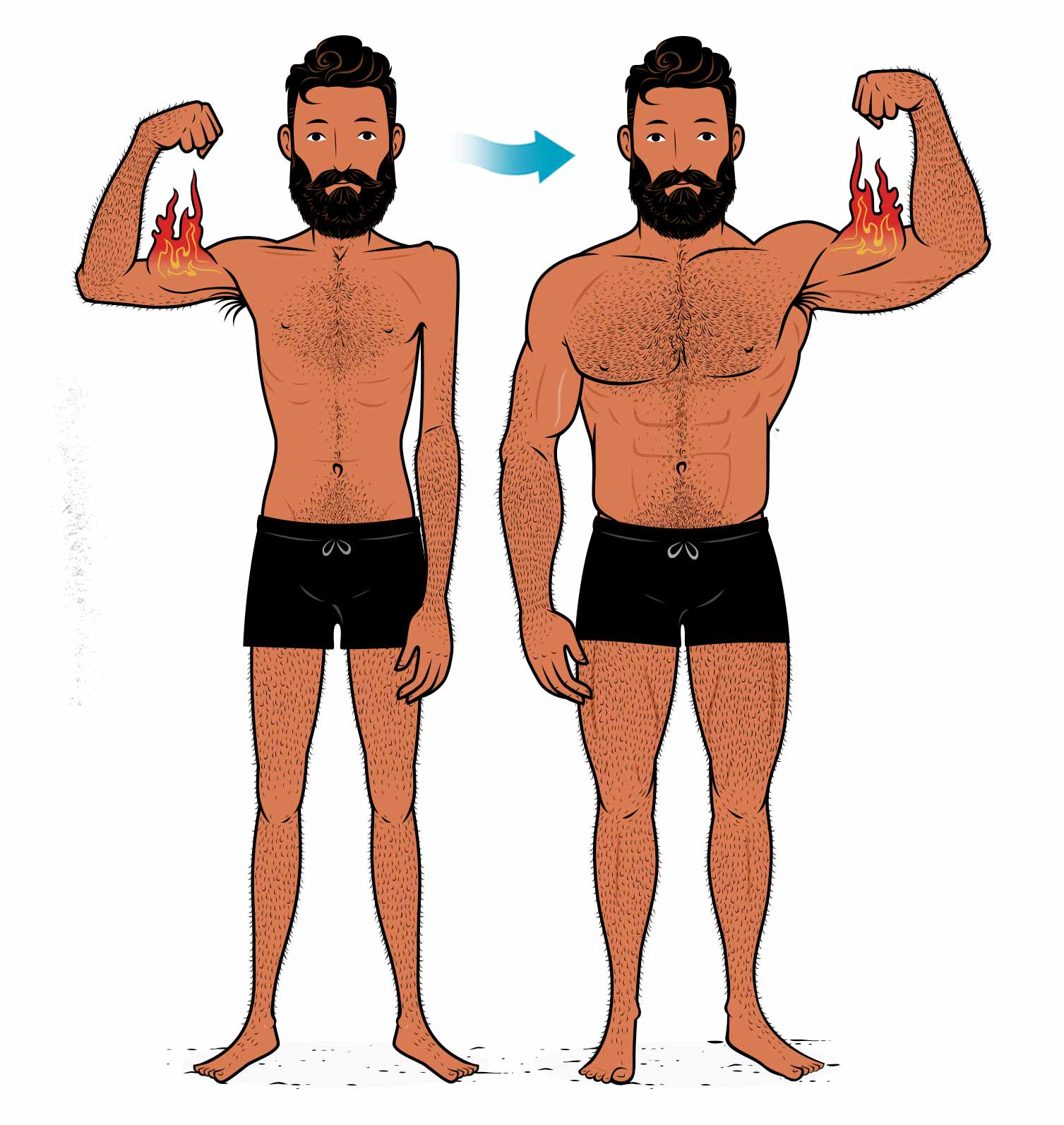
Video Version
I made a video about how some skinny people have much faster metabolisms than you’d expect. It’s actually a bit trickier than that, though. Many of us have average metabolisms most of the time but faster metabolisms when we attempt to overeat. The video delves into all of that.
The article goes a bit deeper and provides references for all of our claims. So, if you want to learn even more, read on!
Introduction
I had a horrible time gaining weight. I’m a so-called “hardgainer.” I have a fast metabolism that adapts easily. Whenever I would try to eat more food, my metabolism would increase, cancelling out my attempt at weight gain. After a few failed bulking attempts, I started to think it might even be impossible for me to bulk up.
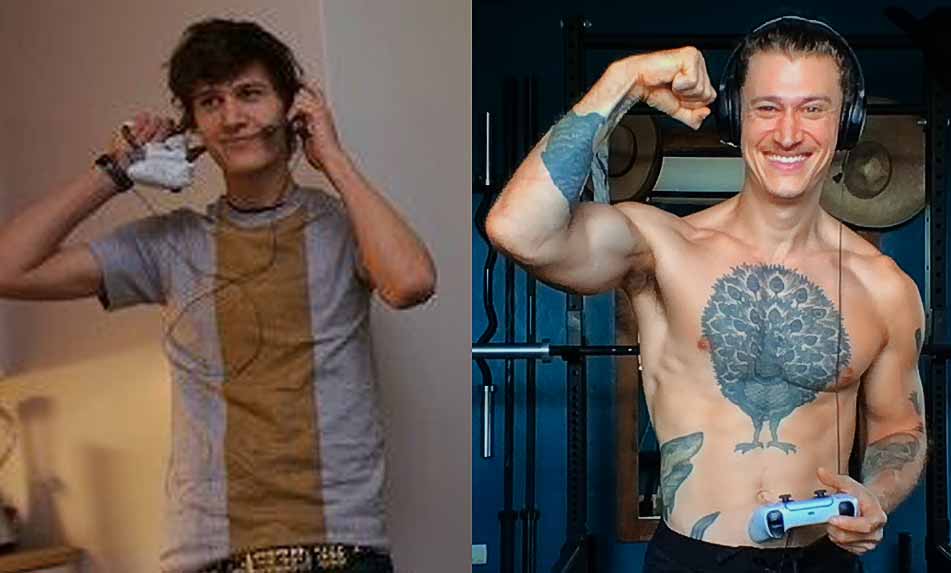
But it wasn’t impossible. I eventually figured out how to gain weight. In my mid-twenties, I gained 65 pounds, going from 130 pounds up to 195 pounds at around 11% body fat. I’m 6’2, so that weight gain had me going from underweight all the way up to “overweight.”

During that time, I met Marco. Similar to me, Marco’s personally gained 63 pounds, bringing him from 150 up to 220 pounds at under 10% body fat. Marco also has a degree in health sciences (BHSc), and he’s a certified trainer (PTS) and nutrition coach (PN). In university, he was the strength coach in charge of helping his college football team bulk up. After graduating, he interned under Eric Cressey (the strength coach for the Yankees), then started working with professional and Olympic athletes.
The reason it’s so important for athletes to gain weight is that it helps them gain strength, power, and momentum. That was true for Marco and me, too. I’m a nerdy graphic designer. I’m not athletic at all. But I went from benching 65 pounds up to 315 pounds. I also improved my heart health, mood, and sleep. Gaining weight is bad for most people, but for skinny guys like us, it was exactly what we needed.

My wife, a certified nutritionist, also started lifting and eating for muscle growth, going from 97 up to 119 pounds. Unlike Marco and I, she isn’t tall. She’s only 5’4. And yet her bones are still slender, she’s still naturally thin, and she still has a fast metabolism. That can happen, too.
We all loved how we felt after gaining weight, and that love led us into forming this business together. This is our specialty. We love this stuff. We love helping naturally skinny people gain weight. This is what we’ve done for the past ten years, working with over 10,000 naturally skinny people.
In this guide, we’ll walk you through the process of gaining weight with a fast metabolism. It’s hard, but it’s not impossible. And the good news is, once you gain the weight, it will stick around without much effort. Gaining weight is hard, maintaining it isn’t.
Fast Metabolisms Vs Adaptive Metabolisms
There are a few reasons why your metabolism might be fast. When Marco worked with professional athletes, most of them were extremely active, making it almost impossible for them to gain weight. They’re a classic example of people with fast metabolisms. Elite athletes burn tons of energy because they’re always moving, always spending energy. That’s where Marco came in. His job was to help them pack on muscle. And he’s that way, too. He burns energy the normal way. He’s very active.
But being proportionally thinner can increase your metabolism, too. Here’s how:
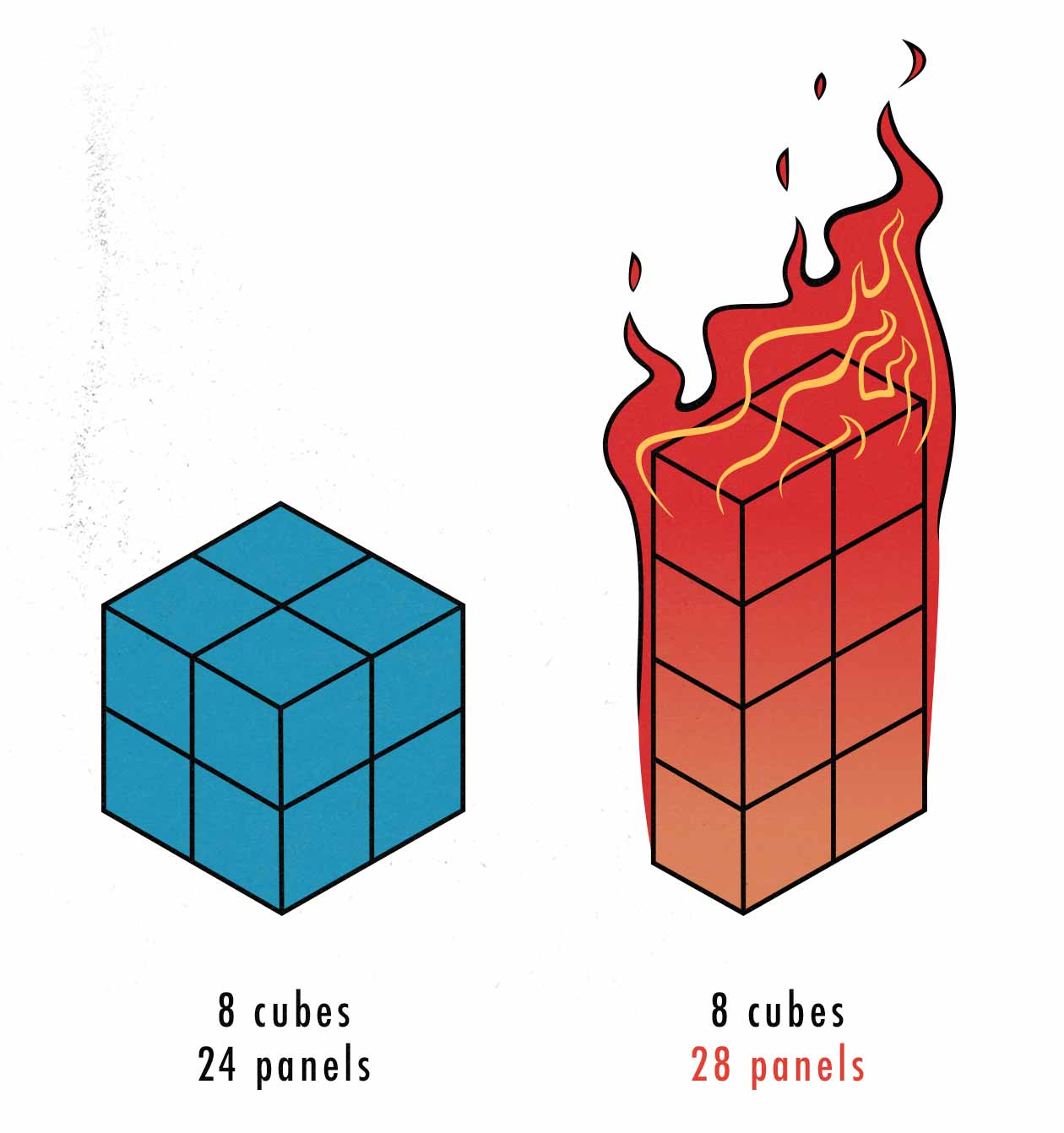
Even though both of these shapes have the same mass (8 cubes), the thinner one has a greater surface area (4 extra panels). If the thin shape were a person, it would lose 17% more body heat. If that skinny rectangle was you, you’d need to eat more calories to maintain your body weight.
Think of a tall, thin giraffe radiating out its heat to stay cool in the heat. Compare that to a seal using its squat shape to stay warm in freezing water. Different shapes have different benefits.
Now, how much does this matter? It’s hard to say. The three of us are built like giraffes. We’re long and thin, with narrow frames and slender bones. This line of thinking holds up for us. But I’m not sure how large of a factor it is.
And then there are hardgainers. Some people eat more calories, store more calories, and gain more weight. Other people eat more calories, burn more calories, and don’t gain weight. That second person has an adaptive metabolism. He’s a so-called “hardgainer.”
Many of us hardgainers are tall, thin, and have trouble gaining weight, even if we aren’t all that active. And it’s not just that our metabolisms are fast, it’s also that when we try to eat more food, our metabolisms increase, preventing weight gain. Let’s talk about that.
Do Hardgainers Have Bad Muscle-Building Genetics?
Before we go much deeper, we should be clear on our definitions. A “hardgainer” is defined as someone who has trouble gaining weight. It has nothing to do with having bad muscle-building genetics. In our experience, once hardgainers learn how to gain weight, they build muscle just fine:
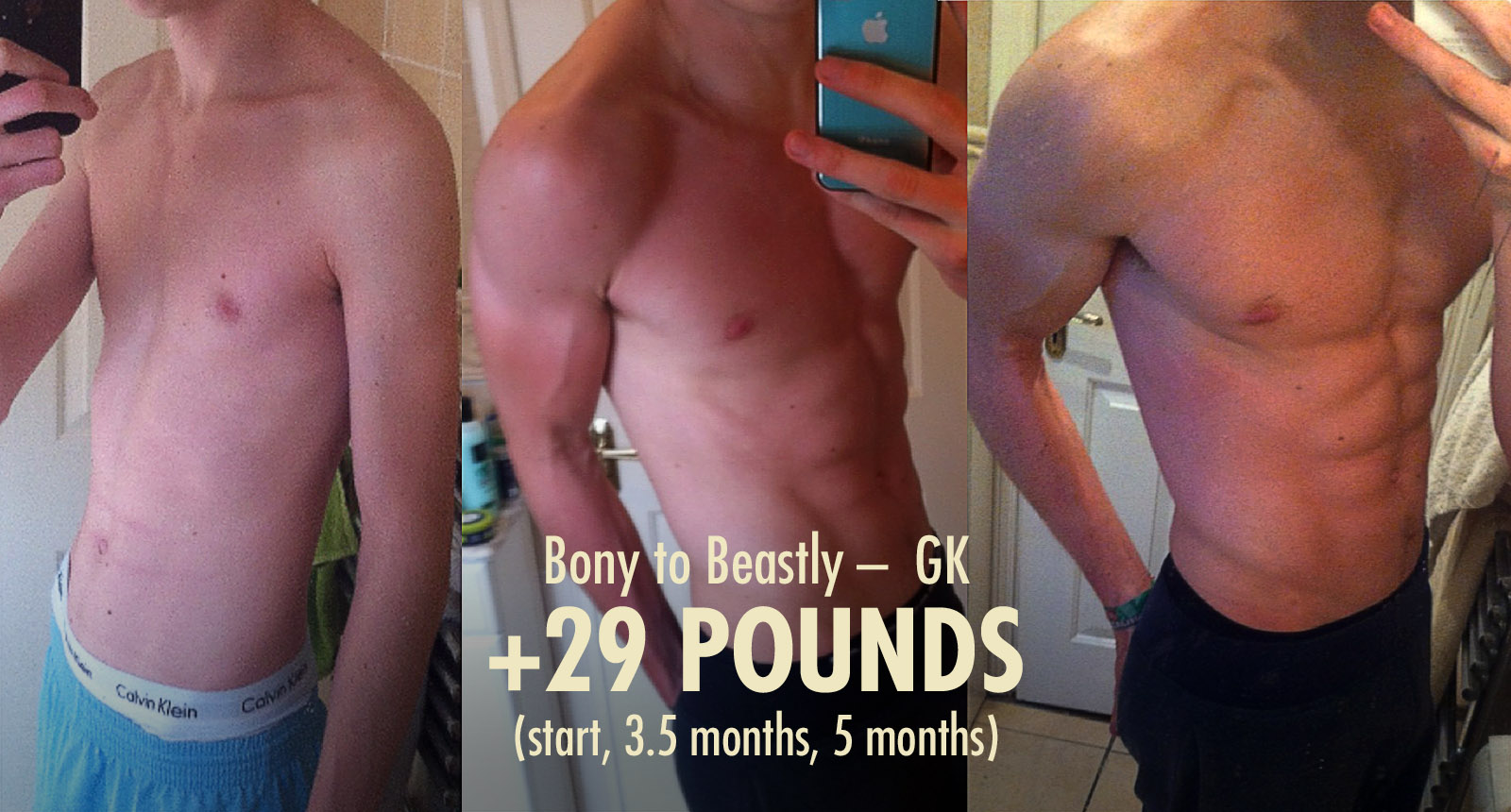
There’s a word for people with poor muscle-building genetics, though. They’re called “non-responders” or “low-responders.” These are the people who respond poorly to weight training. But even then, weight gain is usually the limiting factor. It takes extra energy to build muscle. If you’re a thin person, you don’t have much extra energy stored as fat. If you aren’t getting extra energy from your diet, you won’t be able to build muscle. But if you’re able to train hard enough, get enough good sleep, and eat enough food, you’ll probably have no trouble gaining muscle and strength—even if you’re naturally skinny.

Why Hardgainers Have Trouble Gaining Weight
There’s a famous 1999 study by Levin et al. The researchers put sixteen volunteers on an aggressive bulking diet, overfeeding them by a thousand calories every day for eight weeks straight. As expected, most of the participants gained quite a lot of weight. One person gained 9.3 pounds.
But some of the participants hardly gained any weight at all. Another person gained less than a pound. The researchers were confused. Where did all the extra calories go? The researchers dubbed the people who resisted weight gain “hardgainers.” A new line of research was born.
A year later, in 2000, one of Levine’s follow-up studies got to the bottom of the mystery. When you overfeed most people, they produce more heat while digesting the extra food, but not much else changes. But when you overfeed a hardgainer, they get fidgety. They pace. They stand in odd postures. They find ways to spend the extra energy. All of it totally subconscious. They called this non-exercise activity thermogenesis (NEAT).
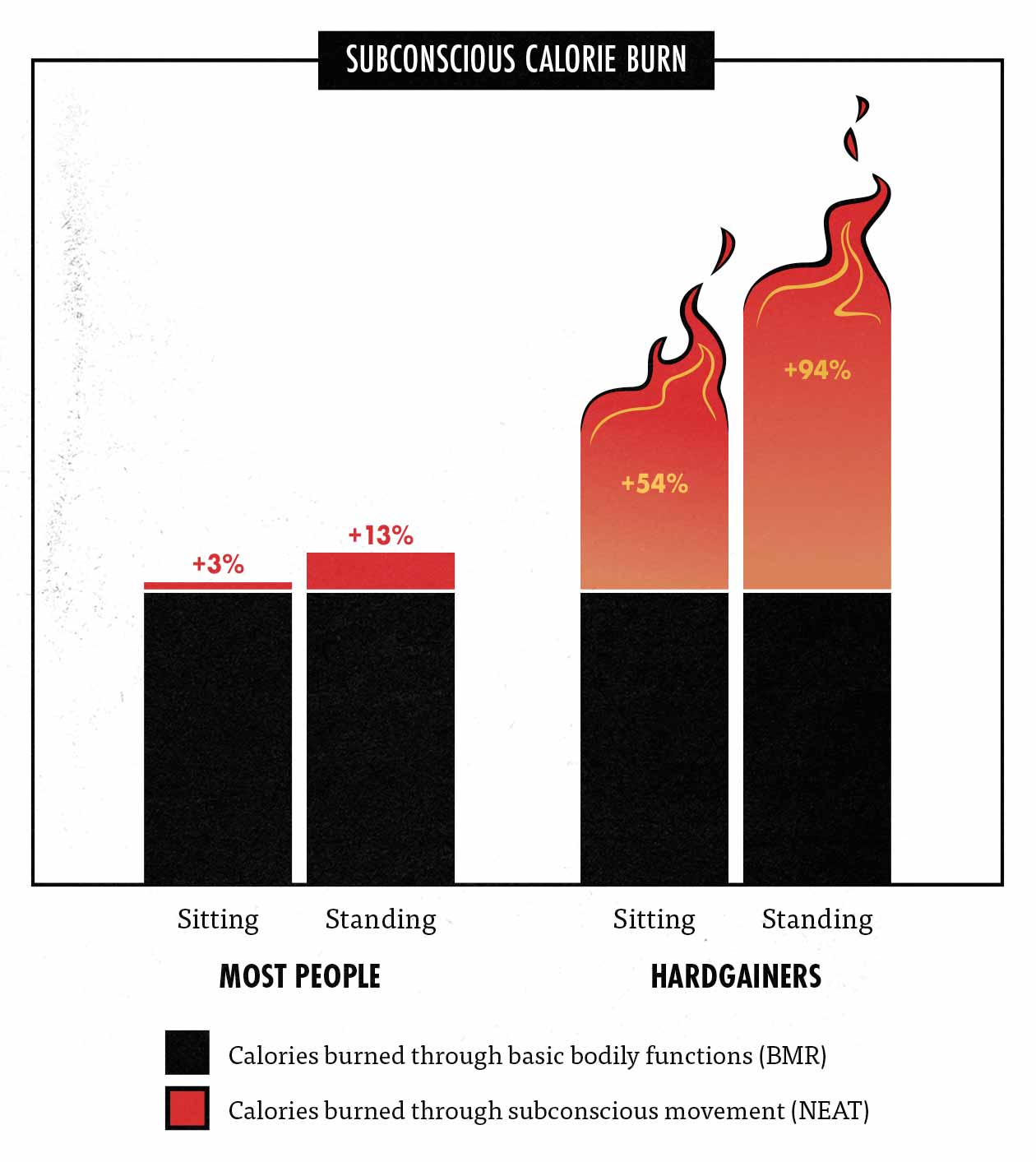
When I read this study, it blew my mind. In my early twenties, at 6’2 and 130 pounds, people teased me for being so thin, but I couldn’t gain weight to save my life. They also teased me for always pacing while talking, bouncing my feet while working at the computer, and being totally incapable of simply holding still.
On the one hand, this was great news. I wasn’t crazy. I really did have a faster metabolism. Or at least I did when I was trying to gain weight.
On the other hand, this kind of research can be discouraging. If eating more calories just makes us burn more calories, how can we ever hope to gain weight? But by the time I read this, I had already gained over 50 pounds. I already knew there was a solution.
Progressively Overload Your Metabolism
In our article on progressive overload, we told the story of Milo of Croton. He’s the legendary Greek wrestler who carried a calf as it grew into a bull. As the calf grew heavier, his muscles were forced to grow bigger and stronger. This is the idea of progressive overload. If you want to keep growing stronger, you need to keep increasing the amount of weight you lift.
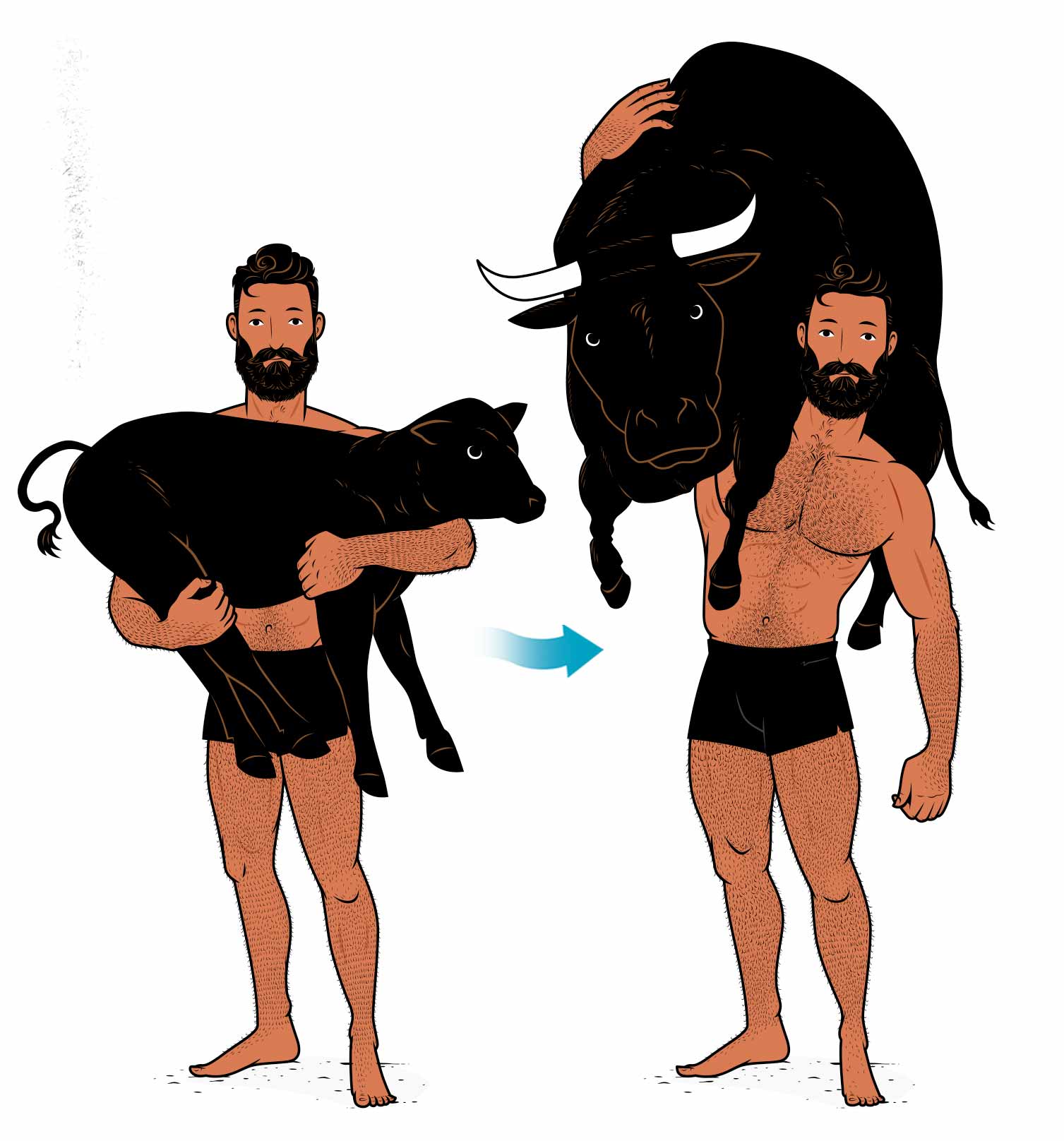
Most people know to use progressive overload in their workout programs, but they forgot about it with their diets. When they start trying to gain weight, they use some sort of calorie calculator, plugging a few factors into an algorithm. It spits out a static calorie goal, and that’s what they use. Maybe if you weigh 130 pounds, it says you burn around 2300 calories per day. So to gain weight, you add 500 calories on top of that—2800 calories. In theory, that should have you gaining around a pound per week… right?
Not quite. As you gain weight, your metabolism will increase. Here’s why:
- NEAT: as we covered above, some people start subconsciously being more active when they have more calories coming in. This is especially exaggerated in hardgainers.
- Muscle burns calories: for every pound of muscle you gain, you’ll burn around 6 more calories per day. That’s an extra 120 calories for every 20 pounds of muscle you gain.
- The more you weigh, the more energy it takes to move around: as you grow heavier, you’ll need to haul around more weight, burning more calories. For most people, this isn’t a big deal. But the more active you are, the more dramatic the effect can be.
- The more you eat, the hotter you get: we don’t digest food with perfect efficiency. Some of the energy is lost as heat. This is called the thermic effect of food (TEF), and it’s especially exaggerated with protein. People tend to eat more protein when trying to gain muscle.
- The more you eat, the less hungry you get: this doesn’t affect how many calories you burn, but it does effect your ability to eat enough food. If you’re perpetually full, good luck trying to eat a weight-gain diet. This was a big problem for me. Sometimes, I’d skip meals. Other times, I’d give up at the end of the day, going to bed before eating my last snack.
So you might add 500 calories to your diet and gain half a pound per week. And then over the next few weeks, that weight gain might trickle to a halt. Maybe you wind up at 132 pounds eating 2800 calories and not gaining any weight at all. This is exactly what happened to the first hardgainer in that first study. Despite eating a thousand extra calories every single day for eight weeks in a row, he only gained a pound.
That’s why calorie calculators are, at best, a rough starting point. If you want to keep gaining weight consistently, you need to think of your calorie intake the same way you think about the weights you lift. You need to progressively increase your calorie intake to continue overloading your growing body.
How to Gain Weight—Consistently
When you first start bulking up, you can use a calorie calculator if you want. It doesn’t matter how precise you are. It’s just a rough starting point. Here’s a simple way to calculate your bulking calories:
- If you’re a skinny-fat beginner or you’re worried about gaining fat, 18x your bodyweight in pounds (40x your weight in kilos) is a good place to start for men. That’s 2700 calories if you weigh 150 pounds. 14x your bodyweight works well for women (33x your weight in kilos). That’s 1680 calories if you weigh 120 pounds. With this lower starting point, you’re less likely to gain too much weight in your first week. Just be prepared to increase your calorie intake if you don’t gain weight. (You might also like our articles for skinny-fat guys and skinny-fat women.)
- If you’re a skinny beginner who’s eager to bulk up, 22x your bodyweight in pounds (48x your weight in kilos) is a good starting point for men. That’s 2860 calories if you weigh 130 pounds. 16x your bodyweight works well for women (35x your weight in kilos). That’s 1600 calories if you weigh 100 pounds. With this higher starting point, you’re more likely to gain weight in your first week. But feel free to slow things down if you notice that you’re gaining fat.
If your diet is fairly consistent every day, and you always have the same meals and snacks at the same times, then another approach is simply to add around 250–500 calories into your diet. That’s not too much. It’s a handful of trail mix, a tall glass of milk or soy milk, or a couple of scoops of whey protein with a banana.
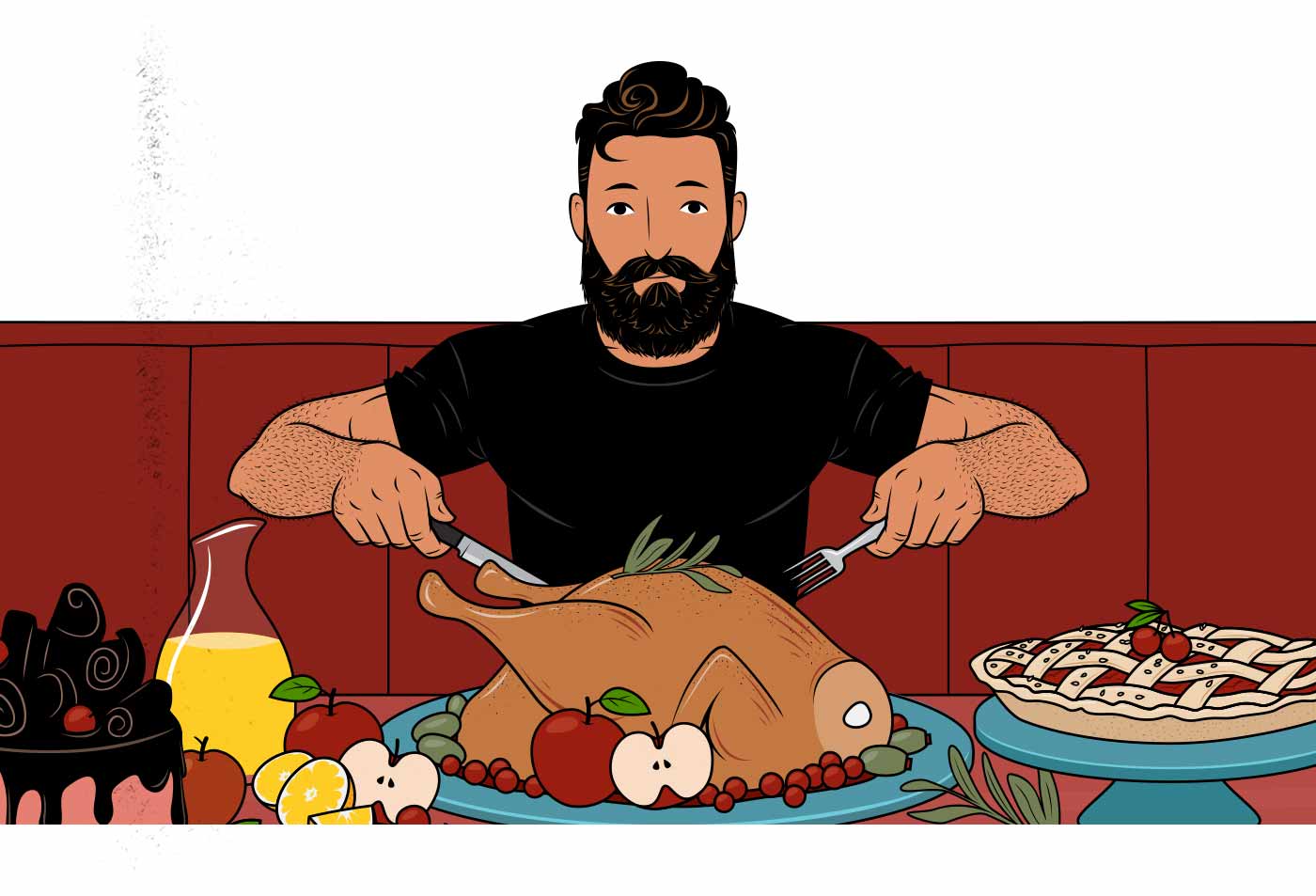
But remember that this is just a starting point. The real trick is to weigh yourself every week, see how much weight you’re gaining, and adjust your calorie intake accordingly. Maybe you weigh yourself on Sunday mornings. Or maybe you weigh yourself every morning, tallying up a weekly average.
If a couple of weeks go by where you haven’t gained weight, add another 200 calories into your diet. As your metabolism adapts to your growing body, you give it more calories. This sounds so simple—and it is—but I don’t mean to make it sound easy. If you have a small appetite or stomach (like me!) this can be brutally hard.
Here’s our article about how to eat more calories. This is how I was able to eat enough calories to gain weight, even with my metabolism fighting me every step of the way.
We also have articles about how to eat a good bulking diet, both for men and for women. Those articles include more information about what to eat, how fast you should gain weight, and how to adjust your calorie intake.
Do You Need to Count Calories?
You need to eat enough calories, but you don’t need to count them. Calorie counting is like following a budget. If your budget helps you earn more than you spend, great. But you don’t actually need a budget. All you need to do is earn more than you spend. The same is true with calories.
If you eat more calories than you burn, you’ll gain weight. If counting calories helps you do that, great. But you don’t have to count calories All that matters is that you eat more calories than you burn. So to gain weight, you don’t need to count anything, you just need to eat a little more food whenever your weight gain stalls. That can be s simple as drinking a larger smoothie, having an extra glass of milk, or having an extra handful of trail mix.
If you’re a beginner, it can be helpful to count calories for a few weeks. That way you learn how many calories are in the foods you eat. Think of it like looking figuring out how much money you earn, looking at the price tags of the things you buy, and figuring out how the balance works out. If you never bother with any of that, you won’t know how much you’re earning or spending. It will be hard to make consistent savings. Same thing with calories. It helps to know. That’s how you’ll develop good intuition.
So it’s up to you whether you count calories. But if you’ve never done it before, I think it can be a great learning tool. Don’t do it forever, but consider doing it for a few weeks. If you want.
Remember to Train Specifically for Muscle Size
This might go without saying, but remember to follow a good weight training program. If you aren’t stimulating muscle growth with your workout routine, around 2/3 of the weight you gain will be fat. The best way to gain weight leanly is to train directly for muscle growth—hypertrophy training.

The other nice thing about hypertrophy training is that it won’t just help you gain weight, it will also preserve your muscle mass if you ever accidentally lose weight. I know for me, sometimes life will get busy or stressful, and I’ll accidentally drop a few pounds. But because I’m lifting weights, all I lose is fat. I get leaner instead of smaller.
This can create a nice rhythm where you go through a few months of gaining weight, aiming to gain mostly muscle. Then you relax and stop overeating. You let your weight drift back down a few pounds, losing a few pounds of fat. In the end, you wind up bigger and leaner than when you started.
For more, we have articles about how to train for muscle growth for men and for women.
Get Plenty of Good Sleep
Most research shows that people who don’t get enough sleep tend to eat more calories. But most people are overweight, and when they’re stressed, busy, or tired, they gain weight. We aren’t like that. When life gets hard, people with fast metabolisms often lose weight.
When you get enough sleep, you’ll have more energy and willpower. That energy will help you stick to your workout routine, and it will also help you make good food choices. More specifically, it will help you eat that extra snack you wanted to skip.
Getting enough sleep will also help you gain weight more leanly. It’s one of the very best things you can do to improve your bulking results. For more, we have a full article on how to sleep for muscle growth.
Summary
Some people really do burn more calories. Maybe they’re bigger, more active, or eat foods that convert more energy into heat (such as protein). But a lot of skinny guys are “hardgainers.” We don’t just have fast metabolisms, we also have adaptive metabolisms. When we eat more calories, our bodies burn more calories, cancelling out our attempts to gain weight. This is a well-researched and well-documented phenomenon (study, study, study). It’s called non-exercise activity thermogenesis (NEAT). And it can be super annoying.
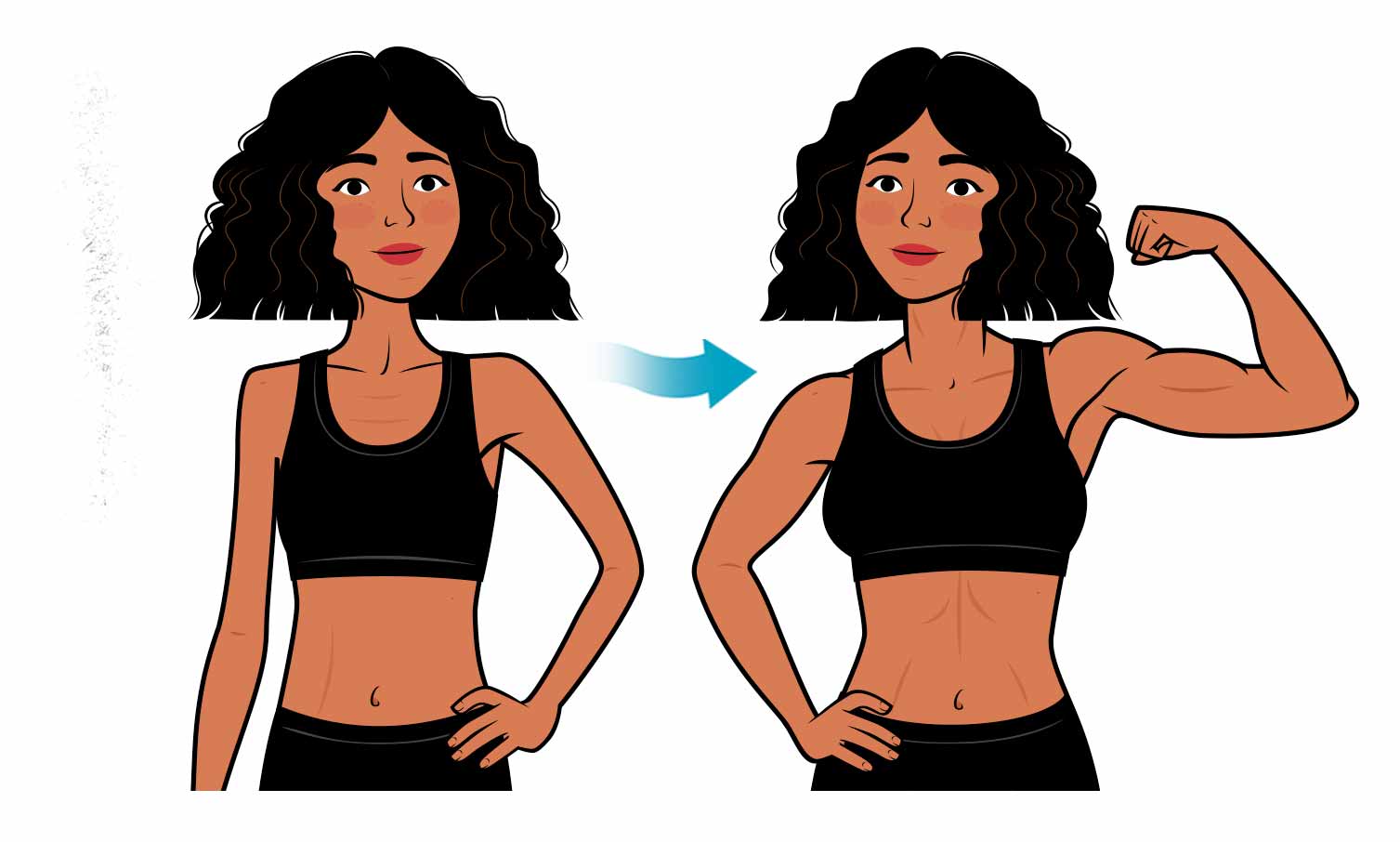
The good news is, your ability to burn calories isn’t limitless. As your metabolism adapts by burning more calories, you can respond by eating more calories. If you aren’t gaining at least a little bit of weight every couple of weeks, add 200 calories to your diet. If your weight gain stalls again, add another 200 calories. That’s how to gain weight with a fast metabolism.
Even better, once you finish gaining weight, you can stop eating in a calorie surplus. Your metabolism will go back to normal. You won’t need to eat a ridiculous amount of food forever. You can go back to following your appetite.
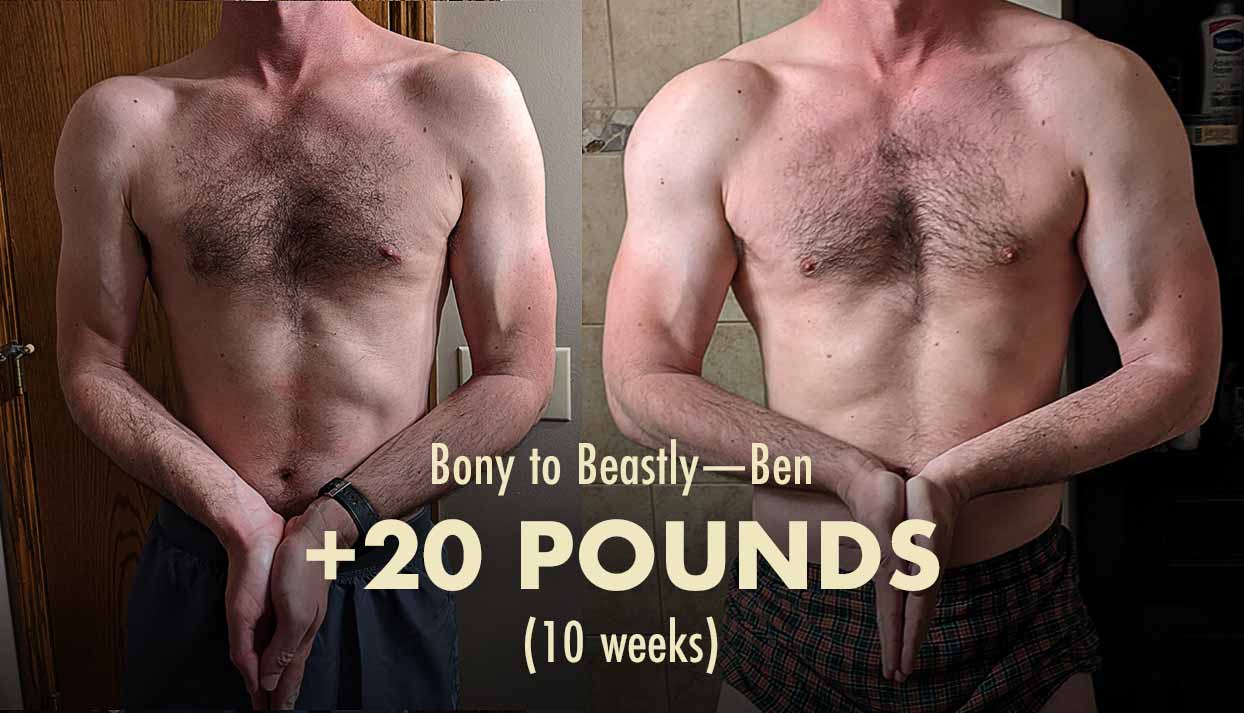
Alright. That does it for now. If you want more muscle-building information, we have a free bulking newsletter for skinny guys and for thin women. If you want a full foundational bulking program, including a 5-month full-body workout routine, diet guide, recipe book, and online coaching, check out our Bony to Beastly Bulking Program (for men) or Bony to Bombshell Program (for women).



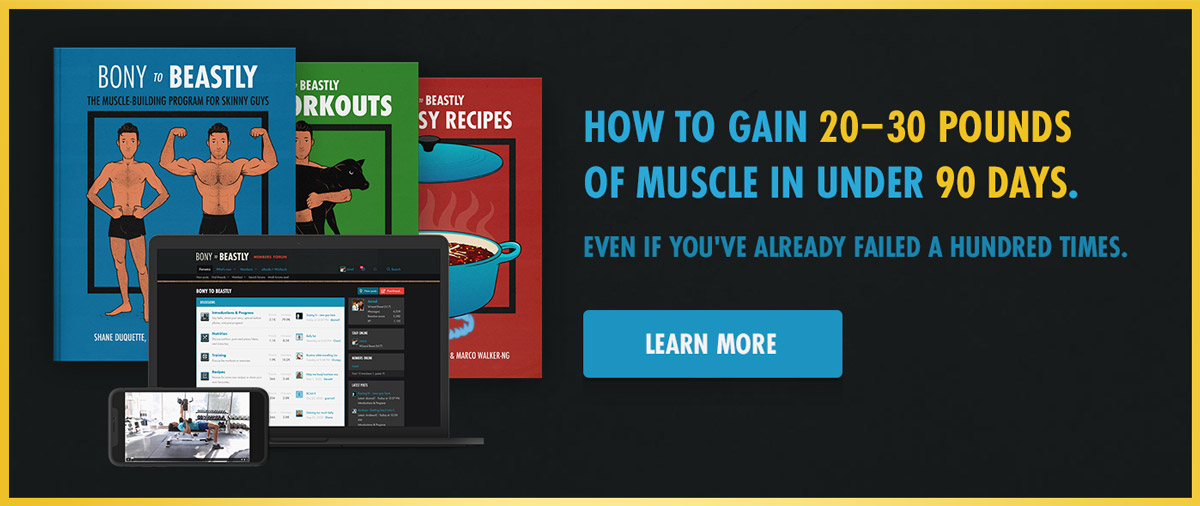
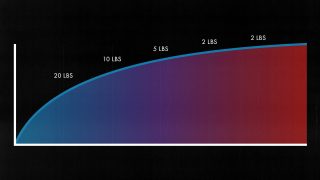


Hey guys,
I lost about 15kgs in the last 3 months due to several factors:
-Not working out at all. (I had eye surgery and was not allowed to lift.)
-Not eating enough. (Did not work out, lost appetite :))
-Being on my feet all day long.
-Not being allowed to take any supplements due to doctor’s recommendation. (Eye surgery.)
I am eager to get back to the gym next week, and I would like to take advantage of muscle memory to regain most if not all of the weight. I have your intermediate bulking program. I plan to do the 4-day hard version in my home gym, with 30 minutes of cardio each day + 1 hour of cardio on rest days (walking/cycling) since I spend most of my days working in front of the computer.
My question is, would having a diet with a very large surplus cause a huge amount of fat gain or would it help me gain back muscle faster? I currently weigh about 65kgs, down from about 80kgs. I considered myself an intermediate lifter. I had pretty good numbers in each big lifts (110kg x 8 bench press, 130kg x 3 front squat, 185kg x 3 deadlift). I am wondering if a good diet with lots of protein and calories would help me bounce back, or if it would just cause fat gain. I put together a diet with about 4200 calories and 240g of protein. I remember you guys had articles about muscle memory and how others could gain back like 30-40 pounds of lean mass in a month. I’m wondering if I could do the same.
Thank you for your answer!
Hey Ben, oh no! That sounds rough!
The most I’ve ever lost was during the year where I got engaged, my father-in-law passed away, and my fiancée got pregnant. My appetite disappeared and my priorities were elsewhere, but I only lost 15 pounds, not kilos. 15 kilos is a lot!
Yeah, you’re right. Gaining the muscle back shouldn’t be too difficult. And you can regain that muscle quite quickly, too. And, yeah, there are people who have regained that much weight in a single month. I wouldn’t recommend gaining weight THAT quickly, though. I’d aim to gain more like a couple of pounds per week. It would take a few months instead of one, but you’ll be way less likely to gain fat. You also won’t need nearly as dramatic of a calorie surplus, and your body won’t be going through such a large swing in weight.
With all of this fitness stuff, sometimes being a bit less extreme can lead to better long-term results with fewer downsides.
Good luck, man! You can definitely gain it all back, and then some!
Thanks Shane!
I will take a bit less extreme approach, as you advised and will let you guys know how it went. I plan to document it with my friend. He also stopped training at the same time as me. We were doing the same program together, but instead of losing weight, he lost muscle AND gained some fat around the waist.
Curious how our bodies will transform. Hopefully, we can succeed and give some hope to other guys who stopped going to the gym for a few months for whatever reason and plan to bounce back.
Awesome! Definitely let me know how it goes! Good luck 😀
I’ve been a member of Bony to Bombshell since November 2018. I think emailing us new articles/featured articles periodically is a great idea to keep interest up, and to keep us moving forward as we read about your suggestions! It makes perfect sense that our thin bones, and fast and adaptive metabolisms put us into a difficult spot when it comes to gaining and keeping our weight. As we age, we must continue to move ahead with the same principles, while at the same time being on the lookout for signs that we’re asking too much/have gone too far. All the foods we consume should be calorie/nutrient-dense, with appropriate exercise sessions along with rest/sleep to keep us going as well as we can for as long as we can!
Thank you Gail! That means a lot 🙂
I don’t aim for ALL the food I eat to be nutrient-dense. I’m down for a dessert or junk food in moderation. I have a beer or two every day, too. From what I’ve seen, aiming to eat around 80% whole foods seems to be just as good as 100%. We still get all the vitamins, minerals, fibre, and phytonutrients we need, and it’s often easier and more enjoyable—at least for me! But that’s obviously totally up to you 🙂
Thanks, Shane! That reminds me of one of your buzz words….”fidgeting.” Fidgeting can occur if we are trying for 100% and then feel we don’t achieve it when we need only 80%. I know I advise baby steps, moderation and not to target perfection, so now let’s follow my own advice! I can feel better with this paradigm about the almost daily small servings of ice cream I’ve been having lately! Good quality high-fat dairy! Or the continued eating when I really am full! I’m amazed at times that my digestion is holding up as well as it is.
Thinking about your “progressive overload” at my stage of life. I will just have to see how far it can go. I’ve even been thinking of some “chips” of some kind too, dipped into or spread onto something good. Too easy to get into a rut. same foods over and over.
Thanks for your thoughts!
Hey guys, thanks for keeping the good content coming! The occasional email can really bump up my motivation.
I’ve been slowly gaining weight over more than a year (including several plateaus in between) and recently, my weight has dropped down again. I don’t want to blame my genetics or exercise program too much as I think it’s more related to my diet. I’m often okay with not eating much and being a little hungry (especially over the summer) and I’ve found that it’s a lot easier to keep up the progress when there’s less variation in what I eat. You do mention this in your article but you don’t address how to reach a proper calorie intake when the times, types and amounts of food are inconsistent. This especially happens when going out and enjoying life as well as during vacations. I will be travelling for a few weeks and if I’m lucky, I won’t lose too much weight. Do you have any suggestions for when you have an irregular schedule? I feel like playing catch-up by “eating a little bit more” is hard to implement.